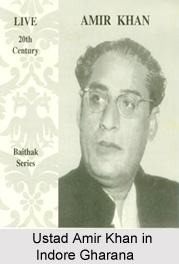 Indore gharana is one of the vocal gharanas of Indian classical music. It was founded by Amir Khan. He studied the styles of Abdul Wahid Khan, Aman Ali Khan, Rajab Ali Khan and Abdul Karim Khan and amalgamated the essence of the styles of these four maestros with his own intellectual approach to music, and conceived the Indore gharana of music.
Indore gharana is one of the vocal gharanas of Indian classical music. It was founded by Amir Khan. He studied the styles of Abdul Wahid Khan, Aman Ali Khan, Rajab Ali Khan and Abdul Karim Khan and amalgamated the essence of the styles of these four maestros with his own intellectual approach to music, and conceived the Indore gharana of music.
Ustad Amir Khan, who was the pioneer of Indore Gharana, grew up in Indore, but he did not like the factionalism inherent in the gharana tradition.
The performances in the Indore gharana are noted by the vilambit tempo in the style of Abdul Wahid Khan, and the tans reminiscent of Rajab Ali Khan.
The merukhand structure is similar to that practiced by Aman Ali Khan of the Bhendibazaar gharana. The khayal gayaki in the Indore gharana retains the slow development and restraint from frills as in the dhrupad. Mohan Nadkarni says of Amir Khan`s music that whereas Bade Ghulam Ali Khan`s music was extroverted and exuberant, Amir Khan`s was an introverted, dignified `darbar` style
The conviction about the importance of poetry in khayal compositions has also marked the singing of the Indore gharana. Some of the characteristics of Indore Gharana are
•Slow-tempo raga development
•Improvisation mostly in lower and middle octaves
•Tendency towards serious and expansive (darbari) ragas
•Emphasis on melody
•Bol alap and sargam using merukhand patterns
•Sparing application of murki and other embellishments to preserve introspective quality
•Use of kan swaras (acciaccatura) in all parts of performance
•Rare use of tihai
•Careful enunciation of text of bandish - the bandish performance may or may not include antara
•Multiple laya jatis in a single taan
•Mixture of taan types in a single taan
•Use of ruba`idar tarana (considered similar to chhota khyal)
Indore Gharana has become a powerful stream in modern Hindustani music. The direct disciples of Amir Khan included Pandith Amarnath, Shankar Lal Mishra, Kankana Banerjee, Purvi Mukherjee, and others. However, a number of influential musicians including Sultan Khan have grown up in its folds.
Amir Khan was born in a family of musicians in Indore. His father, Shahmir Khan, a sarangi and veena player of the Bhendibazaar gharana, served at the court of the Holkars of Indore. His grandfather, Change Khan, was a singer in the court of Bahadurshah Zafar. Amir Ali`s mother died when he was nine years old. He had a younger brother, Bashir, who went on to become a sarangi player at the Indore station of All India Radio. Amir Khan was initially trained in the sarangi by his father. However, seeing his interest in vocal music, his father gradually devoted more time to vocal training, focusing on the merukhand technique. Aamir Ali was exposed at an early age to many different styles, since just about every musician who visited Indore would come to their house, and there would be mehfils at their place on a regular basis. He also learned the basics of tabla playing from one of his maternal uncles, who was a tabla player.




















